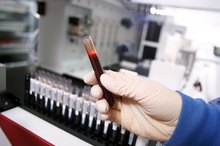What does fact checked mean?
At Healthfully, we strive to deliver objective content that is accurate and up-to-date. Our team periodically reviews articles in order to ensure content quality. The sources cited below consist of evidence from peer-reviewed journals, prominent medical organizations, academic associations, and government data.
The information contained on this site is for informational purposes only, and should not be used as a substitute for the advice of a professional health care provider. Please check with the appropriate physician regarding health questions and concerns. Although we strive to deliver accurate and up-to-date information, no guarantee to that effect is made.
Vitamin B-12 Deficiency and the Spleen
Vitamin B-12, also called cobalamin, is needed to make DNA, nerve tissue and red blood cells. Lack of vitamin B-12 or its absorption eventually causes abnormal red blood cell development. The spleen functions to filter the blood and remove dead and abnormal red and white blood cells out of circulation. Too many abnormal blood cells clog the filtering tissues of the spleen, leading to enlargement and tenderness.
Vitamin B-12 Function
Vitamin B-12 is required for the timely synthesis of DNA during cell division, to produce myelin, the protective sheath surrounding nerves that allows for efficient flow of electrical signals, and for the proper development of red blood cells in bone marrow. The timely construction of DNA helixes is especially important in tissues where cells are dividing rapidly, such as the bone marrow, where red blood cells are formed before being released into the bloodstream. The recommended daily allowance for vitamin B-12 ranges from 0.4 micrograms in infants under six months old to 2.8 micrograms for lactating females, according to the Office of Dietary Supplements 1. Adult males require 2.4 micrograms daily.
- Vitamin B-12 is required for the timely synthesis of DNA during cell division, to produce myelin, the protective sheath surrounding nerves that allows for efficient flow of electrical signals, and for the proper development of red blood cells in bone marrow.
- The recommended daily allowance for vitamin B-12 ranges from 0.4 micrograms in infants under six months old to 2.8 micrograms for lactating females, according to the Office of Dietary Supplements 1.
Vitamin B-12 Deficiency
Vitamin B12 Deficiency & Headaches
Learn More
Chronic lack of vitamin B12 results in deficiency symptoms. Vegetarians who avoid meat, poultry, fish and dairy products are at higher risks for developing vitamin B-12 deficiency. Macrocytic anemia is usually caused by a deficiency or defective absorption of either vitamin B-12 or folic acid.
- Chronic lack of vitamin B12 results in deficiency symptoms.
- Vegetarians who avoid meat, poultry, fish and dairy products are at higher risks for developing vitamin B-12 deficiency.
Deficiency and Spleen Enlargement
The primary role of the spleen is to filter dead or abnormal cells from the bloodstream, but if too many cells need to be removed, then the filtering tissues of the spleen become clogged and ineffective. The large size of the abnormal blood cells also compounds the problem. The end result is a swollen and enlarged spleen unable to function properly. An enlarged spleen often becomes tender, which can be felt underneath the heart.
- The primary role of the spleen is to filter dead or abnormal cells from the bloodstream, but if too many cells need to be removed, then the filtering tissues of the spleen become clogged and ineffective.
Vitamin B-12 Sources
Why Is My Spleen Calcified?
Learn More
Good sources of vitamin B-12 include most animal products, such as:
- meat
- poultry
- fish
- eggs
- milk
- butter
Vitamin B-12 also occurs in some plants, such as seaweeds and spinach, as well as many nuts and legumes. Fermented soy products contain vitamin B-12 also, but very little of it is able to be processed in the human gastrointestinal system. To normally absorb vitamin B-12 from food, a gastric protein known as intrinsic factor is required, which some people do not have due to genetic diseases.
Related Articles
References
- Office of Dietary Supplements: National Health Institutes: Vitamin B12
- “Human Biochemistry and Disease”; Gerald Litwack; 2008
- “Harrison's Principles of Internal Medicine”; A. Fauci et al.; 2008
- “American Dietetic Association Complete Food and Nutrition Guide”; American Dietetic Association; 2006
- Office of Dietary Supplements. Vitamin B12. Updated 2020.
- Johns Hopkins Medicine. Vitamin B12 deficiency anemia. 2020.
- Coppen A, Bolander-Gouaille C. Treatment of depression: time to consider folic acid and vitamin B12. J Psychopharmacol. 2005;19(1):59-65. doi:10.1177/0269881105048899
- Kannan R, Ng MJ. Cutaneous lesions and vitamin B12 deficiency: an often-forgotten link. Can Fam Physician. 2008;54(4):529-532.
- Markišić M, Pavlović AM, Pavlović DM. The impact of homocysteine, vitamin B12, and vitamin D levels on functional outcome after first-ever ischaemic stroke. Biomed Res Int. 2017;2017:5489057. doi:10.1155/2017/5489057
- Harvard Health. The A list of B12 foods.
- Harvard Health. Getting enough vitamin B12. 2020.
Writer Bio
Owen Bond began writing professionally in 1997. Bond wrote and published a monthly nutritional newsletter for six years while working in Brisbane, Australia as an accredited nutritionalist. Some of his articles were published in the "Brisbane Courier-Mail" newspaper. He received a Master of Science in nutrition from the University of Saskatchewan.









